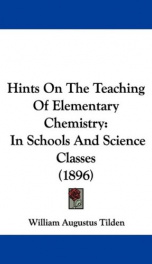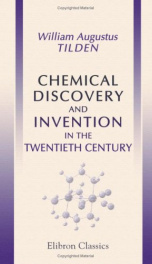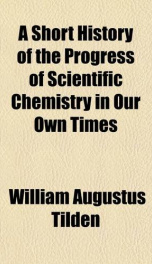hints on the teaching of elementary chemistry in schools and science classes

HINTS ON THE TEACHING OF ELEMENTARY CHEMISTRY IN SCHOOLS AND SCIENCE - 1896 - PREFACE - . . . THE issue of the new Syllabus of Inorganic and Organic Chemistry by the Department of Science and Art marks a very important advance in the history of the teaching of these subjects in this country. In this Syllabus the treatment of Chemistry from the theoretical side remains llecessarily at the discretion of the teacher, though from the order in which the subdivisions of the matter for treatment are placed, it is obvious that, in the early stages especially, it is considered desirable to keep theory in a subordinate position, and to make use of it only when a sufficient foundation of fact has been duly acquired by the pupil. According to the experience of the Author, it is scarcely possible to use a purely inductive method in dealing with ydun students but, though this may be admitted, tfie necessity of clearly distinguishing fact. from hypothesis requires to be established far more definitely than at present in the-minds of a large proportion of the teachers iv Teaching of Elementary Chemistry whose pupils present themselves for the examinations of the Department. In the earliest stages, the learners attention and energy are usually tvholly used up in the process of exact observation. To see and accurately record the whole of a given phenomenon is enough for young boys and girls, and, until sufficient practice and experience in this direction have been gained, it is a better educational exercise than the attempt to solve problems which, to render-them simple enough, require the neglect of part of the phenomena. For example, the investigations of the changes which occur when a piece of sheet copper is heated in the air requires for a complete answer observations a on the iridescent colours first visible, b the black coating which succeeds, c the red lining to the scales which may be separated on cooling, d the temperature at which these changes occur, e th e alteration in weight of the mass, f changes in the surrounding air, c. Observation of all these facts is possible even for the beginner but when he is in possession of the whole, he would be a . wonderful boy indeed who could, without assistance, infer that the products contain oxygen as well as copper, and that there are two oxides of copper of definite composition, to say nothing about the colours of thin films. Chemistry is a science which, in its modern form, has sprung up almost entirely within the Preface v memory of living man, and its boundaries, already far reaching, are being rapidly extendcd year by year, and even month by month, by the labours of an army of workers. This condition of growth constitutes a featu e of the science which should render it as a study attractive in no ordinary degree and the teacher who desires to make use. of it as an effective educational agent . must devote some part of his time to extending and consolidating his own knowledge... --This text refers to an alternate Paperback edition.
Info about the book
Series:
Unknown
ASIN:
B002WU23SI
Rating:
4.5/5 (1)Your rating:
0/5
Languge:
English
Users who have this book
Users who want this book
What readers are saying
What do you think? Write your own comment on this book!
write a commentif you like hints on the teaching of elementary chemistry in schools and science classes try:
Do you want to read a book that interests you? It’s EASY!
Create an account and send a request for reading to other users on the Webpage of the book!




